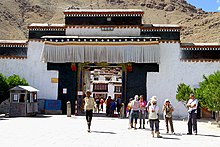Tashilhunpo
| Tashi Lhunpo | |
|---|---|

Entrance to Tashi Lhunpo Monastery
|
|
| Tibetan transcription(s) | |
| Tibetan | བཀྲ་ཤིས་ལྷུན་པོ་ |
| Wylie transliteration | bkra shis lhun po |
| Pronunciation in IPA | [ʈáɕi l̥ympo] |
| Official transcription (China) | Zhaxi Lhünbo |
| THL | Trashi Lhünpo |
| Other transcriptions | Tashi Lhunpo, Tashi Lhümpo |
| Chinese transcription(s) | |
| Traditional | 扎什倫布寺 |
| Simplified | 扎什伦布寺 |
| Pinyin | Zhāshí Lúnbù Sì |
|
|
|
| Coordinates | 29°16′03″N 88°52′52″E / 29.26750°N 88.88111°E |
| Monastery information | |
| Location | Shigatse, Tibet, China |
| Founded by | 1st Dalai Lama |
| Founded | 1447 |
| Type | Tibetan Buddhist |
| Sect | Gelug |
| Lineage | Panchen Lama |
Tashi Lhunpo Monastery (Tibetan: བཀྲ་ཤིས་ལྷུན་པོ་), founded in 1447 by the 1st Dalai Lama, is a historic and culturally important monastery in Shigatse, the second-largest city in Tibet.
The monastery was sacked when the Gorkha Kingdom invaded Tibet and captured Shigatse in 1791 before a combined Tibetan and Chinese army drove them back as far as the outskirts of Kathmandu, when they were forced to agree to keep the peace in the future, pay tribute every five years, and return what they had looted from Tashi Lhunpo.
The monastery is the traditional seat of successive Panchen Lamas, the second highest ranking tulku lineage in the Gelug tradition of Tibetan Buddhism. The "Tashi" or Panchen Lama had temporal power over three small districts, though not over the town of Shigatse itself, which was administered by a dzongpön (prefect) appointed from Lhasa.
Located on a hill in the center of the city, the full name in Tibetan of the monastery means "all fortune and happiness gathered here" or "heap of glory". Captain Samuel Turner, a British officer with the East India Company who visited the monastery in the late 18th century, described it in the following terms:
"If the magnificence of the place was to be increased by any external cause, none could more superbly have adorned its numerous gilded canopies and turrets than the sun rising in full splendour directly opposite. It presented a view wonderfully beautiful and brilliant; the effect was little short of magic, and it made an impression which no time will ever efface from my mind."
...
Wikipedia

